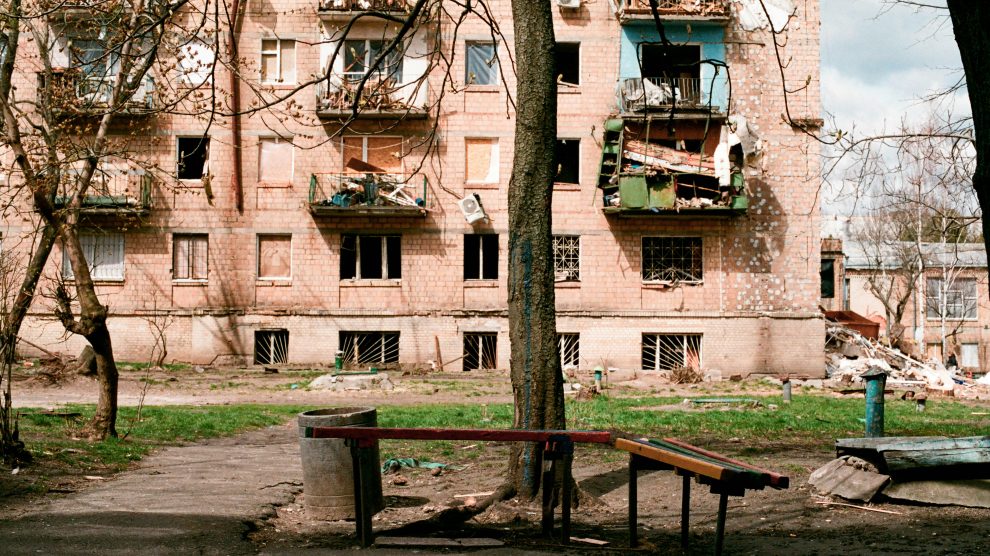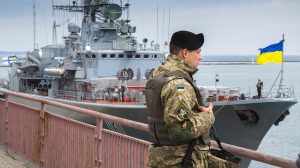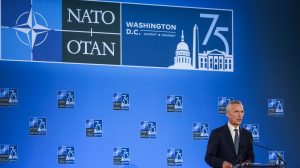Catch up quickly with the stories from Central and Eastern Europe that matter, this week led by the ongoing bombardment of Ukraine by Russian forces, primarily targeting energy facilities.
Russia’s war on Ukraine
Russia fired salvoes of drones and missiles overnight at southern and eastern regions of Ukraine, authorities said on Thursday, injuring more than a dozen people as the Kremlin’s forces persevered with attritional attacks designed to wear down Ukrainian defences.
Air defence systems intercepted 26 out of 28 Shahed drones, Ukraine’s air force said. Russian forces also launched five missiles overnight, it said.
The regular bombardment of Ukraine by the Kremlin’s forces during the war has recently gained momentum, with missile barrages of the capital Kyiv and strikes on energy facilities across the country. The attacks also aim to weaken Ukrainian morale and act as retribution for Ukrainian long-range strikes on Russian soil.
One of Russia’s goals is to “deplete Ukraine’s inventory of ground-based air defence,” according to a recent military assessment published by the International Institute for Strategic Studies.
That would erode some of Ukraine’s combat ability as it waits on pledged but delayed military support from the West, including ammunition for its artillery and air defences.
“Kyiv is confronted by the threat that an attritional war in the air domain will increasingly favour Russia without adequate support from the U.S. and its allies,” the IISS said. “Ukraine’s ability to continue to counter Russian air threats and impose costs on the Russian Aerospace Forces remains important to the outcome of the war.”
Meanwhile, there were signs this week that Ukraine’s recent tactic of targeting Russian oil refineries and deposits was beginning to make a real impact.
On Monday, Vasyl Maliuk, head of the Security Service of Ukraine (SSU), said on the ICTV channel that the service’s special operations to damage oil refineries in Russia had reduced oil production and processing by 12 per cent.
On Wednesday, Reuters reported that Russia increased gasoline imports from neighbouring Belarus in March to tackle the risk of shortages in its domestic market because of unscheduled repairs at Russian refineries after drone attacks.
Usually Russia is a net exporter of fuel and a supplier to international markets, but the disruption of Russian refining has forced oil companies to import.
Belarus has two oil refineries—the Naftan oil refinery in Novopolotsk and the Mozyr oil refinery. Each has a capacity of 12 million tonnes per year (some 240,000 barrels per day), but they typically run at lower capacity, each refining about nine million tons per year (some 180,000 barrels per day).
It is unclear how much Belarus can increase production and industry sources have said there are technical bottlenecks.
Poland on Thursday temporarily opened one border crossing with Ukraine, Kyiv said, as government representatives met in Warsaw to defuse a dispute over Ukrainian grain imports.
The State Border Guard Service of Ukraine said in a statement on Telegram that 120 trucks were expected to cross the Uhryniv-Dolhobichuv checkpoint into Poland. It said the crossing would remain open until April 2.
The announcement was made as the Polish and Ukrainian governments met for more than six hours in Warsaw to discuss a row over Ukrainian grain imports, but a breakthrough appears unlikely.
Border crossings with Ukraine have been blocked for weeks as farmers in Poland demand the reimposition of customs duties on agricultural imports from Ukraine, which were waived following Russian’s full-scale invasion in 2022.
Other news from the region
A pro-western career diplomat defeated a close ally of Slovakia’s populist Prime Minister Robert Fico in the first round of the presidential election on Sunday to set up a runoff between the two to decide who will succeed Zuzana Čaputová, the country’s first female president, who chose not to seek a second term in the largely ceremonial post. Former Foreign Minister Ivan Korčok won 42.13 per cent of the votes late Sunday, with Peter Pellegrini in second with 37.28 per cent. Because no candidate won an outright majority, a runoff will be held April 6.
On Wednesday, protesters in Slovakia formed a human chain around the country’s public television and radio building Wednesday in anger over a takeover plan by the government. The takeover plan was drafted by Culture Minister Martina Šimkovičová, who represents an ultra-nationalist member party of the coalition government and has worked for an internet television outlet known for spreading disinformation. The plan has been condemned by President Čaputová, opposition parties, local journalists, international media organisations, the European Commission.
Bulgaria this week lurched toward a potential snap election—the sixth in just over three years—after the country’s two main political parties failed to renew a unity government forged to overcome political turmoil. Mariya Gabriel, a former European Union commissioner and a premier-designate of the country’s biggest party, GERB, scrapped an attempt to form a cabinet. Her decision was backed in a parliamentary vote Tuesday by GERB’s coalition partner over the past nine months, We Continue the Change. With no party controlling a majority in parliament, a national vote could be held as early as June.
Two Baltic presidents this week urged other European countries to do more to prepare for a possible armed confrontation with Russia. Edgars Rinkēvičs, Latvia’s head of state, told the Financial Times that European countries needed to return to “cold war-era spending” levels and should discuss the return of compulsory military service. “There is a need for serious discussion about conscription,” Rinkēvičs said. Alar Karis, his Estonian counterpart, said in a separate interview that a special tax to fund military purchases was worth considering, while Europe should aim to match US defence spending.
A Romanian state agency for rural investments is using artificial intelligence to help farmers apply for European Union funds, it said on Monday, a first in one of the EU’s least developed digital economies. The Agency for Financing Rural Investments (AFIR) told Reuters it began using robots from software automation company UiPath a little over two years ago. The robots have taken over the time-consuming tasks of tapping state databases to procure land registry and judicial records for farmers, entrepreneurs and state institutions applying for EU funds.
Environmental watchdogs this week urged the European Bank for Reconstruction and Development (EBRD), to reconsider its planned loan for a Greece-North Macedonia gas pipeline, insisting it will create more pollution. In a formal complaint to the EBRD, the Prague-based CEE Bankwatch Network and the Skopje-based Eko-svest, call on the EBRD to cancel the funding of the project, which they say is contradictory to national and EU law. If built, the gas pipeline would carry an additional 1.5 billion cubic metres of gas a year into North Macedonia—three times the country’s 2021 consumption.
On Thursday, 20 activists from Romania, Bulgaria and Czechia gathered at OMV Petrom headquarters in Bucharest, Romania, to protest against the proposed Neptun Deep project which they claim would threaten the EU’s carbon neutrality target, and harm wildlife in the Black Sea. It would also be Europe’s largest offshore gas project and make Romania the EU’s largest fossil gas producer. “New fossil gas projects are incompatible with limiting global heating to 1.5°C. The last thing the world needs is new fossil gas drilling operations,” said Lisa Göldner, European Energy campaigner, Greenpeace Germany.
The executive secretary of Georgia’s ruling Georgian Dream party, Mamuka Mdinaradze, announced this week that the party has initiated a bill on constitutional amendments that would significantly limit LGBT+ rights in the South Caucasus country. According to Mdinaradze, the bill would ban transgender surgeries, child adoption by same-sex couples, indicating gender that is other than male or female in official documents, and organising public events propagating same-sex relations. The proposal comes as the country is getting ready for parliamentary elections in October.
Georgia’s footballers meanwhile created history on Tuesday by reaching their first major tournament with a penalty shootout win over Greece in their Euro 2024 play-off. Substitute Nika Kvekveskiri scored the winning penalty, squeezing his effort past the outstretched arm of Greece keeper Odysseas Vlachodimos. Georgian supporters ran on to the pitch to congratulate their players, having seen the national side—which played its first match in 1990 when still occupied by the Soviet Union—qualify for a major tournament at the 15th attempt. Ukraine also qualified this week, defeating Iceland in a play-off.
Photo by Maksym Pozniak-Haraburda on Unsplash.
Unlike many news and information platforms, Emerging Europe is free to read, and always will be. There is no paywall here. We are independent, not affiliated with nor representing any political party or business organisation. We want the very best for emerging Europe, nothing more, nothing less. Your support will help us continue to spread the word about this amazing region.
You can contribute here. Thank you.







Add Comment